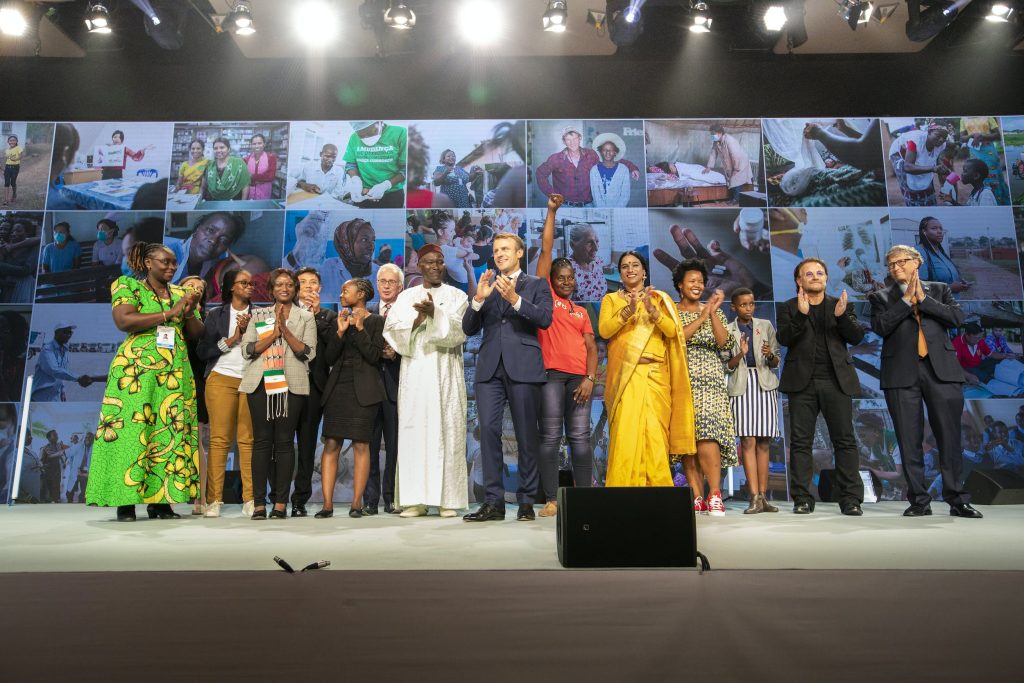We find ourselves in challenging times. Many countries are looking inward and turning away from global cooperation. But we know a lot of the health challenges facing the world – including the world’s three deadliest diseases, HIV/AIDS, tuberculosis (TB), and malaria – don’t respect borders. The only way we can solve these complex global challenges is through collective action.
Global cooperation to fight AIDS, TB, and malaria
On October 10, 2019, during the Sixth Replenishment Conference for the Global Fund to Fight AIDS, Tuberculosis, and Malaria, leaders from around the world came together in a historic and inspiring demonstration of the power of partnerships to drive progress. Government and private sector donors answered the global call to step up the fight and get back on track to fight the world’s largest epidemics, pledging nearly US$14 billion over the next three years.
As French President Emmanuel Macron, the host of the pledging conference, stated during his opening remarks, the ambitious US$14 billion target was “the bare minimum needed to get back on track to fight against these three epidemics.” The full replenishment of the Global Fund will help save an additional 16 million lives and bring us closer to achieving to critical health targets under the Sustainable Development Goals (SDGs).
However, the impact of the Global Fund goes beyond three diseases. The Global Fund’s work advances important targets under SDG 3, the goal to provide health and well-being for all. In fact, Global Fund investments are expected to yield a return on investment of 1 to 19, with every dollar invested resulting in US$19 in health gains and economic returns, further contributing to the achievement of the overall SDG agenda. Because the SDGs are all connected, progress on one goal can spur progress on others – from SDG 1: ending poverty to SDG 5: achieving gender equity.
It’s simple. As many global leaders said during the Replenishment conference: Divided we fall. Together we thrive. President Macron demonstrated incredible leadership as a standard bearer for this message of global solidarity.
Collective action for impact
Hitting this aggressive replenishment target is an unprecedented feat for any multilateral health fund. It is also a testament to donors’ commitment to working together to find global solutions to these three epidemics, which threaten both the health and prosperity of people everywhere.
Despite increasing demands for donor dollars and flatlined development budgets, most countries increased their pledges by roughly 15% compared to their previous replenishment commitments.
Many new and returning donors also made commitments – including nearly US$1 billion in commitments from the private sector and a doubling of pledged amounts from African countries.
A bi-partisan delegation of Congressional representatives also reaffirmed the U.S. Government’s commitment to the Global Fund, indicating a $1.56 billion commitment for Fiscal Year 2020, with the intent to commit nearly $4.7 billion over the next three-year period.
The significant increases from donors is a reflection of the hard work global health advocates and champions have put in over the last year to ensure government and private sector leaders know how critical it is to invest in the Global Fund so we have a chance to reach our collective development goals by 2030.
Why it matters
Reaching the $14 billion replenishment goal will allow the Global Fund to help get the fight against HIV/AIDS, TB, and malaria back on track. These funds will help: cut the mortality rate across the three diseases by 52% by 2023; avert 234 million infections or cases, reducing the incidence rate by 42% across the three diseases by 2023; and reduce the death toll across the three diseases to 1.3 million in 2023, down from 4.1 million in 2005.
It will also help deliver on the promise Universal Health Coverage. The Global Fund has committed to strengthen health care systems by directly investing approximately US$4 billion to build capacities such as diagnostic tools, surveillance systems, supply chain management and training for health care workers, as well as accelerating the shift toward flexible, tailored, and patient-centered models of care. It will also reinforce health security by helping build more resilient health systems, with stronger surveillance, diagnostic, and emergency response capabilities. Finally, it will directly tackle key threats to global health security, such as multidrug-resistant TB.
The Global Fund has also prioritized tackling inequities in health, including gender- and human rights-related barriers to access, by working with partners, such as civil society and affected communities, to build more inclusive health systems that leave no one behind – a pivotal part of delivering on the SDGs.
As UN Deputy Secretary-General Amina Mohammed said during the Replenishment Conference: “We strive for the Sustainable Development Goals to create a fairer, healthier, and happier world. Ending the three epidemics is critical to providing Universal Health Coverage and health and well-being for all.” The Deputy Secretary-General also underscored the continued need for global cooperation to reach these goals, saying, “The United Nations stands with the Global Fund and its partners. Ending the epidemics of HIV, TB, and malaria is within reach.”
The work continues
While we celebrate the historic collective commitment to global development, we cannot let up our efforts if we are going to deliver on the ambitious promises of the SDGs. We must continue the hard work of ensuring everyone, everywhere has access to quality, affordable prevention, testing, and treatment services for HIV/AIDS, TB, and malaria. The extraordinary pledges made this week have allowed us to move closer toward achieving our shared vision to be the generation that ends these three diseases within our lifetime.
We now must continue to step up the fight. As the late former UN Secretary-General Kofi Annan said when he reflected on his role in the creation of a Global Fund nearly two decades ago: “All of us can be proud of what we have established, what we have done, but more importantly, be conscious of what still needs to be done. …Everyone has his or her part to play.”

